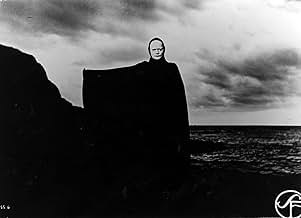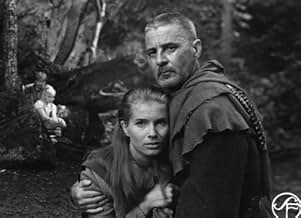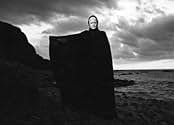Ein Mann sucht nach Antworten auf Fragen zu Leben, Tod und der Existenz Gottes, als er während der Pest eine Partie Schach gegen den Sensenmann spielt.Ein Mann sucht nach Antworten auf Fragen zu Leben, Tod und der Existenz Gottes, als er während der Pest eine Partie Schach gegen den Sensenmann spielt.Ein Mann sucht nach Antworten auf Fragen zu Leben, Tod und der Existenz Gottes, als er während der Pest eine Partie Schach gegen den Sensenmann spielt.
- Auszeichnungen
- 9 Gewinne & 2 Nominierungen insgesamt
Siv Aleros
- Flagellant
- (Nicht genannt)
Sten Ardenstam
- Knight
- (Nicht genannt)
Harry Asklund
- The Landlord
- (Nicht genannt)
Benkt-Åke Benktsson
- Merchant at the Inn
- (Nicht genannt)
Zusammenfassung
Reviewers say 'The Seventh Seal' delves into mortality, faith, and existential questions through its medieval setting. The chess game with Death symbolizes humanity's struggle against fate. Themes of societal chaos and religious fervor are depicted through plague, witch burnings, and flagellants. Characters like the knight, squire, and actors provide varied perspectives on life and death, enriching the narrative. The film's allegorical approach resonates with contemporary audiences, highlighting the timeless nature of its themes.
Empfohlene Bewertungen
The mysteries of religion and death have long been a popular focus among artists of all media, including film. And while many films question these mysteries, they seldom provide any real insight into the world of the unknown. In Ingmar Bergman's THE SEVENTH SEAL, these mysteries are not only questioned; they are dissected, splayed, and scrutinized.
THE SEVENTH SEAL could very well serve as sort of a manifesto for existentialism. Its deep acuity and haunting imagery is powerful enough to jar even passive viewers out of their complacency and force them to examine their own reality. The delicately crafted story centers around a 14th century knight named Antonius Block and his ongoing game of chess with a shadowy, hooded figure: Death. Bergman uses this allegory not just to personify death, but to illustrate the lengths man will go to in order to avoid it. In the end, however, Death is a much better player than any of us, and though he may humor some of his opponents by letting them think that they have the advantage, the end result is inevitable: Death always wins. No matter how skillfully we plan our moves or how determined we are to win, we can never beat Death.
In Antonius's search for answers, he encounters a variety of very unique characters, each with their own outlook on life, death, faith, fear and love. Their commentary on such matters is often dryly funny and always brilliant, continuously and effectively challenging our perceptions of the world around us. For me, the dialogue was definitely the high point of the film, as it was extremely thought-provoking and carefully constructed throughout. Almost every line spoken is, in one way or another, daunting and unforgettable. Jöns's description of love as "the blackest of all plagues" is a quote that will forever be engraved in my mind.
THE SEVENTH SEAL truly is a remarkable accomplishment in the world of cinema. It is a deep, mesmerizing, and darkly beautiful work of art. More importantly, THE SEVENTH SEAL is one of those rare movies that doesn't just entertain, but also has the power to change the way one thinks.
THE SEVENTH SEAL could very well serve as sort of a manifesto for existentialism. Its deep acuity and haunting imagery is powerful enough to jar even passive viewers out of their complacency and force them to examine their own reality. The delicately crafted story centers around a 14th century knight named Antonius Block and his ongoing game of chess with a shadowy, hooded figure: Death. Bergman uses this allegory not just to personify death, but to illustrate the lengths man will go to in order to avoid it. In the end, however, Death is a much better player than any of us, and though he may humor some of his opponents by letting them think that they have the advantage, the end result is inevitable: Death always wins. No matter how skillfully we plan our moves or how determined we are to win, we can never beat Death.
In Antonius's search for answers, he encounters a variety of very unique characters, each with their own outlook on life, death, faith, fear and love. Their commentary on such matters is often dryly funny and always brilliant, continuously and effectively challenging our perceptions of the world around us. For me, the dialogue was definitely the high point of the film, as it was extremely thought-provoking and carefully constructed throughout. Almost every line spoken is, in one way or another, daunting and unforgettable. Jöns's description of love as "the blackest of all plagues" is a quote that will forever be engraved in my mind.
THE SEVENTH SEAL truly is a remarkable accomplishment in the world of cinema. It is a deep, mesmerizing, and darkly beautiful work of art. More importantly, THE SEVENTH SEAL is one of those rare movies that doesn't just entertain, but also has the power to change the way one thinks.
One of the most extraordinary movies ever made. I cannot recommend 'The Seventh Seal' highly enough.
'The Seventh Seal' is universally regarded as a masterpiece. It's one of those classics like 'Citizen Kane', 'Rear Window' or 'The Godfather' that has subtlety entered popular culture, so even if you haven't actually seen it you recognize references to it in other movies, TV, magazines and everyday conversation. The thing is like the aforementioned and 'Rashomon' and 'Sunset Blvd' it isn't regarded as a masterpiece for nothing, it really is one. I think anybody who loves movies will be totally knocked out by 'The Seventh Seal'. It's still one of the most extraordinary movies ever made. Visually it's stunning, the acting is first rate, and the end result is mesmerizing. Once seen never forgotten is a cliche, but it's the perfect description for this amazing film. Max von Sydow brilliantly plays Antonius Block, a knight returning from the Crusades who challenges Death (Bengt Ekerot) to a chess match. He is accompanied on his journey home by his cynical squire Jons (Gunnar Bjornstrand). Jons is my favourite character in the movie, and as good as von Sydow is Bjornstrand's performance is even better. I also was very taken by the traveling actors who become part of Block's entourage, Jof (Nils Poppe) and his wife Mia (Bibi Andersson), and confess to developing quite a crush on Mia. I cannot recommend 'The Seventh Seal' highly enough. Don't be put off by Bergman's highbrow reputation, this is a movie that can be appreciated by anybody, especially by old school horror fans. While it isn't strictly a horror movie itself anyone who admires the James Whale and Val Lewton classics of the 1930s and 1940s will find much to enjoy here.
One thing that can be certain after watching the Seventh Seal, outside of being thankful for living in this century, is that Bergman knows his film-making- and imagery. He uses subliminal and not so subliminal techniques to convey a dying, frightened world, where making a living is almost impossible and the debate of god's control over life is discussed like un-rhyming yet fascinating poetry.
The result is beautiful cinema, capturing the always foreboding fear and allure of the almighty and for the waiting death, appropriately staged in post-crusades, mid dark age Europe. Max Von Sydow gives an excellent showing as the opponent of Death (in a clever and meticulous chess game), yet the character of Death, played by Bengt Ekerot with chilling conviction, steals the show, if only for the alluring quality of the character.
Even if the story veers it veers in good and interesting territory, focusing on people who convey Bergman's point and or style. I can't reveal what the bottom line point is (many newcomers to Bergman's work won't either, especially if you're not in the mood for soul searching), but one thing is for certain, an allegory on life and death is shown perfectly in the second to last shot of the reaper and his minions following in a dance across the field. This is one of the most pure of cinema's masterpieces and certainly Bergman's best cine. A++
The result is beautiful cinema, capturing the always foreboding fear and allure of the almighty and for the waiting death, appropriately staged in post-crusades, mid dark age Europe. Max Von Sydow gives an excellent showing as the opponent of Death (in a clever and meticulous chess game), yet the character of Death, played by Bengt Ekerot with chilling conviction, steals the show, if only for the alluring quality of the character.
Even if the story veers it veers in good and interesting territory, focusing on people who convey Bergman's point and or style. I can't reveal what the bottom line point is (many newcomers to Bergman's work won't either, especially if you're not in the mood for soul searching), but one thing is for certain, an allegory on life and death is shown perfectly in the second to last shot of the reaper and his minions following in a dance across the field. This is one of the most pure of cinema's masterpieces and certainly Bergman's best cine. A++
10Xstal
An abstraction of your fears, conjured progressively through years, walks beside you every day, may cause some to halt, then pray; it's a demon that's passed on, through generations come and gone, as fixed and certain as the tide, nowhere for you to run, or hide; is there a game that you can play, that extends your time and stay, with instructions and some rules, that don't leave you, as the fool; can the clock that's counting down, tick half as fast before you frown, and gaze with stoical askance, as you begin, your macabre dance.
Signed, sealed and delivered as many times as you may care for, but the curse of existence is never knowing how the story really ends, or why it was started in the first instance.
Signed, sealed and delivered as many times as you may care for, but the curse of existence is never knowing how the story really ends, or why it was started in the first instance.
First of all, I have taken the time to read some posts on this movie before writing my review because I was searching for lots of answers. Didn't get many though, the popular thing fans like to say (and please, no pun intended) is that it just takes time to understand and appreciate this movie. To this I quickly reply that my perception of "Det Sjunde Inseglet" was that it is a rather dull, if not eventless, movie. It has some really nice moments (and for some reason I really liked the concept of a man playing chess with death itself) but in the end almost nothing is resolved except from the main protagonist who, at the brink of his death, discovers that it's love that makes people want to live ,very roughly put, I apologize, but even this revelation was hidden from the writer of this comment. And this is what bothered me the most, I couldn't read (for the lack of a better word) any of these important details, the movie very coldly rolled in front of my eyes and I just didn't get it! Now the easiest and dumbest thing to say is that this is all the fault of the director for not having a more universal way of film-making, rather the viewer has to decipher such information if he wants to fully appreciate his movies. I've just realized that I could say the same for Kubrick's visionary movies, I didn't like most, scratch that, none of them the first time around, they grew on me after a second viewing. And I dig Kubrick, a lot!!!
I was also surprised with the admiration the cinematography received, it did not impact me whatsoever (and I am more so a visual that a sensual movie buff and love this kind of stuff). All in all, as Antonius Block, I am searching for answers, important ones. It bothers me a lot that I don't appreciate this movie, and I ask anyone to help me resolve my problem.
What am I missing? What don't I get? What should I know about "The Seventh Seal", its meaning, its importance, its making, its director...?
Thank you for your time
I was also surprised with the admiration the cinematography received, it did not impact me whatsoever (and I am more so a visual that a sensual movie buff and love this kind of stuff). All in all, as Antonius Block, I am searching for answers, important ones. It bothers me a lot that I don't appreciate this movie, and I ask anyone to help me resolve my problem.
What am I missing? What don't I get? What should I know about "The Seventh Seal", its meaning, its importance, its making, its director...?
Thank you for your time
Wusstest du schon
- WissenswertesIngmar Bergman credited the film with helping him overcome his crippling fear of death. Because the film dealt so overtly with the subject, he found it a highly cathartic experience.
- PatzerThe chess players focus on capturing the Queen. The Queen was not a super-powerful piece until centuries later when a recent chess-variant initially called "chess of the mad queen" became more popular than the classic game.
- Zitate
Antonius Block: We must make an idol of our fear, and call it god.
- VerbindungenEdited into Severed Ways: The Norse Discovery of America (2007)
Top-Auswahl
Melde dich zum Bewerten an und greife auf die Watchlist für personalisierte Empfehlungen zu.
Details
- Erscheinungsdatum
- Herkunftsland
- Sprachen
- Auch bekannt als
- El séptimo sello
- Drehorte
- Hovs Hallar - Naturreservat, Skåne län, Schweden(Opening beach scene and ending scene)
- Produktionsfirma
- Weitere beteiligte Unternehmen bei IMDbPro anzeigen
Box Office
- Budget
- 150.000 $ (geschätzt)
- Weltweiter Bruttoertrag
- 312.104 $
- Laufzeit1 Stunde 36 Minuten
- Farbe
- Seitenverhältnis
- 1.37 : 1
Zu dieser Seite beitragen
Bearbeitung vorschlagen oder fehlenden Inhalt hinzufügen




































